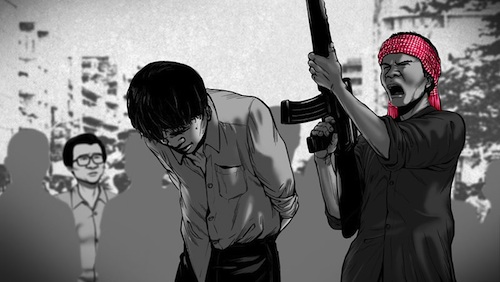By Joe Bendel. Dr. Haing S. Ngor had a reasonable productive film career, but he never landed a role that equaled his Oscar winning debut in Roland Jaffe’s The Killing Fields (although Oliver Stone’s Heaven & Earth will have its champions). Yet, the platform it provided Ngor to keep the memory of the Khmer Rouge genocide alive and to criticize the current undemocratic regime was far more important. It might have even been the reason why the actor and activist was murdered in 1996. The late Ngor will offer his survivor’s testimony once again in The Killing Fields of Dr. Haing S. Ngor, which screens as part of a sidebar tribute to documentarian Arthur Dong at the 2015 Asian American International Film Festival in New York.
Rarely is an actor so closely identified with a film as Dr. Ngor and The Killing Fields. He was not a professional actor when he was cast to play Cambodian journalist Dith Pran, but he could identify with the role only too well. Ngor barely survived the Communist re-education camps, but his pregnant common law (formal marriage having been abolished) wife did not. In an environment of horrific deaths, hers was particularly haunting.
You might think you understand the Communist massacre, chapter and verse, but the experiences Ngor describes in his autobiography (extracts of which are read by his nephew, Wayne Ngor) will shock you nonetheless. For instance, even table utensils were banned (on pain of death) as the decadent tools of western capitalism. To illustrate his experiences during the genocide, Dong often relies on Wilson Wu’s dramatic black-and-white animation that starkly reflects the tenor of the times. These are not things we want to see, but they are necessary to understand Ngor’s life and the utopian ideology he fled.

Dong is an experienced filmmaker, who crafts Ngor’s story with great sensitivity, but also with an eye towards the needs of history. Fortunately, Ngor’s life in America was quite well documented. He assembles quite a bit of primary footage of Ngor, including some unusually heavy commencement speeches. The close participation of Ngor’s surrogate daughter-niece Sophia Ngor and his friend, Iron Triangle co-star, and non-profit foundation executive director Jack Ong also inspire confidence. Of course, high level Khmer Rouge officials were not available for comment, but the allegations of Kaing Guek Eav (a.k.a. “Comrade Duch”) that Ngor was assassinated by the Khmer Rouge are given due consideration.
Dong’s film is both inspiring and horrifying, showing both sides of an incredible life cut short under mysterious circumstances. It never peddles in conspiracy theories, but it makes one wonder nonetheless. It is also something of a wake-up call, especially when it addresses Ngor’s opinions on the not-so untainted regime of today. Timely, moving, and even infuriating, The Killing Fields of Dr. Haing S. Ngor is a truly important film, highly recommended for the socially and historically conscious when it screens this Saturday (7/25) at the Village East, as part of this year’s AAIFF.
LFM GRADE: A
Posted on July 24th, 2015 at 12:43pm.